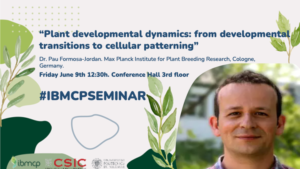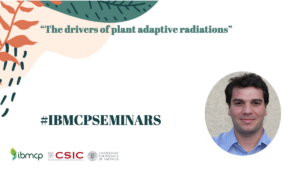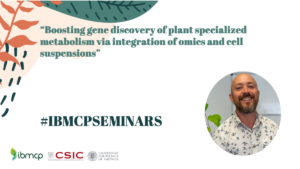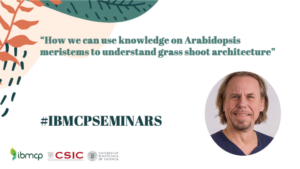Dr. Pau Formosa-Jordan
Max Planck Institute for Plant Breeding Research, Cologne, Germany.
“Plant developmental dynamics: from developmental transitions to cellular patterning”
Plant development occurs as an interplay of signalling, growth and environmental cues, becoming a highly dynamic and complex system. To disentangle such complexity and decipher the underlying principles of plant developmental processes, we focus on studying the regulatory dynamics of developing plant cells and tissues in a quantitative manner, combining mathematical modelling, confocal microscopy and quantitative image analysis. In his talk, Pau Formosa-Jordan will discuss how studying the dynamics of gene regulatory networks can help understanding plant developmental transitions, focusing in particular on the floral transition in the Arabidopsis thalianaplant. Also, he will describe their efforts in understanding how the epidermis of Arabidopsis gets patterned by a mixture of cell types.
Short Bio
Pau is a Physicist by training, and did a Master in Biophysics and PhD in Physics at the University of Barcelona (2013). During this PhD he investigated different problems of pattern formation in animal and plant tissues from a theoretical perspective, in collaboration with experimental groups, under the supervision of Dr Marta Ibañes and Prof Jose María Sancho. He did his postdoctoral research at the Sainsbury Laboratory, at the University of Cambridge, in the Locke, Jönsson and Meyerowitz groups. In his postdoc, he combined theory and experimental approaches to study the dynamics of different processes in plants, ranging from pattern formation in the sepal and shoot meristem, variability in germination, and the dynamics of isolated plant cell regeneration. During his time in Cambridge he was awarded with the Herchel Smith postdoctoral fellowship, and he was also associated to Queens’ College. Since September 2020 he is leading his research group in the Plant Developmental Biology Department at the Max Planck Institute for Plant Breeding Research in Cologne. In his research group they use mathematical modelling, microscopy and quantitative image analysis to better understand the dynamics of plant developmental processes at different scales, from single-cell resolution to the tissue and whole-plant level. Currently, they focus on two different developmental processes in Arabidopsis thaliana: cellular patterning in the leaf epidermis and how gene expression patterns in the shoot apical meristem influence the floral transition and meristem shape. Since May 2022 he joined the Cluster of Excellence on Plant Sciences (CEPLAS) as a Contributing Investigator.
Research group website: https://www.mpipz.
Recent publications
P Formosa-Jordan and B Landrein (In press) Quantifying gene expression domains in plant shoot apical meristems. In: Riechmann JL, Ferrandiz C (eds) Flower Development: Methods and Protocols. Methods in Molecular Biology, Second Edi. Springer
K Abley, P Formosa-Jordan, H Tavares, E YT Chan, M Afsharinafar, O Leyser and J CW Locke (2021) An ABA-GA bistable switch can account for natural variation in the variability of Arabidopsis seed germination time. eLife, 10, e59485.
P Formosa-Jordan, J Teles and H Jönsson (2018) Single-cell approaches for understanding morphogenesis using Computational Morphodynamics. In: Morris R. (eds) Mathematical Modelling in Plant Biology. Springer, Cham
B Landrein, P Formosa-Jordan, A Malivert, C Schuster, CW Melnyk, W Yang, C Turnbull, E M Meyerowitz, J CW Locke and H Jönsson (2018) Nitrate modulates stem cell dynamics in Arabidopsis shoot meristems by regulating WUSCHEL expression through cytokinins. Proc. Nat. Acad. Sci. USA. 115: 1382-1387.
HM Meyer, J Teles, P Formosa-Jordan, R San-Bento, G Ingram, H Jönsson, J CW Locke and A HK. Roeder (2017) Fluctuations of the transcription factor ATML1 pattern giant cells in the Arabidopsis sepal. eLife 6, e19131.
If anyone is interested in meeting with the speaker, please contact Paz Merelo






